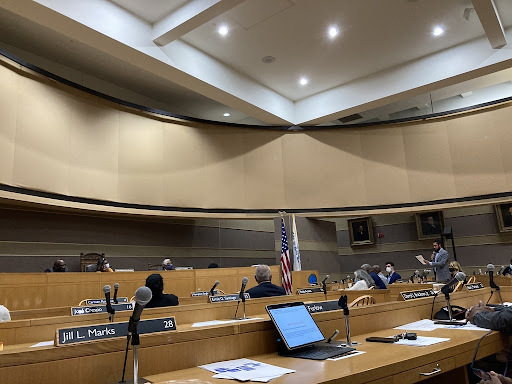In November meeting, City Planning Commission expands affordable housing
In November meeting, City Planning Commission expands affordable housing

Sylvan Lebrun, Contributing Photographer
The New Haven City Planning Commission met this Wednesday, putting into practice the housing legislation passed by the Board of Alders on Oct. 4.
In its November monthly meeting, the City Planning Commission approved site plans for building housing on Chapel, State and Orange Streets, and it approved the sale of city property on Evergreen Court, all while following New Haven’s affordable housing policy. Leslie Radcliffe, chair of the City Planning Commission; Edward Mattison, vice chair; Adam Marchand, commissioner and Ward 23 Alder and Giovanni Zinn, ex officio commissioner and City engineer, all attended the meeting. Commissioners are appointed by the mayor for four-year terms. The Commission meets on the third Wednesday of each month and reviews site plans, property acquisitions and referrals from the Board of Zoning Appeals and the Property Acquisition and Disposition Committee.
“I like the way this project sounds,” Radcliffe said of the first site plan, setting the tone for the remainder of the meeting.
To begin the meeting, the Commission reviewed a site plan for a residential building on the intersection of Chapel and State Street to ensure the type of building, its use and its structure followed New Haven zoning ordinances.
In developer Beacon Communities Corporation’s application to the City Planning Commission, Gregory Muccilli, a partner at Shipman and Goodwin LLC who advises Beacon Communities, explained that the building will “improve a currently under-utilized site.”
The development would fill in the “missing tooth” in what Radcliffe called the “State Street smile” where an empty parking lot stands between two buildings, and would “do a lot to make that line along the street look like a street,” according to Mattison.
When Radcliffe questioned the Beacon representatives about the “affordability aspect” of the project, Muccilli responded that the proposed development would go “beyond the proposed and adopted inclusionary zoning requirements.”
LeAnn Hanfield, director of development for Beacon Communities, explained that 80 percent of the residential dwelling units, or housing units, would be affordable, while the city’s proposed inclusionary zoning laws mandate that 20 percent of residential dwelling units be affordable, in the most extreme case.
For this proposed development, 15 units would be priced at 30 percent of the Area Median Income. Renters for those units would pay no more than $567 a month for a one-bedroom apartment. 31 more units would be priced at 50 percent of the AMI, and another 14 units would be priced at 60 percent of the AMI.
While Zinn and Marchand voiced concerns about the curbs on the sidewalks of the development and the traffic flow pattern for trucks trying to access the back of the building, ultimately their questions were answered by the Beacon representatives.
Marchand described this project as ultimately “very positive,” and moved approval of the site plan. The City Planning Commission approved the plan in a 3-0 vote.
The Committee then rejected a special exception request for a proposed “assembly hall” to share parking with neighboring businesses at 1330 Whalley Ave.
Next, the Committee reviewed a proposed sale of a vacant single-family property at 6 Evergreen Ct, as well as a vacant lot at 8 Evergreen Ct, to National Construction, LLC. National Construction, LLC proposed to renovate the vacant single-family property into a livable single-family property.
The Committee noted that initially, this property was intended to have an accessory dwelling unit (ADU) — a housing unit on the same parcel as a single-family dwelling — attached, but because the owner of the property would not be its occupant, this ADU would not abide by the recently passed affordable housing ordinances.
The ordinance requires that all homeowners applying for ADUs prove that they reside in the structure they are planning to attach an ADU. During deliberations over this ordinance, Marchand explained that this caveat would ensure that “ordinary working people” be prioritized over LLCs or large landlords.
Evan Trachten, property acquisition and disposition coordinator for New Haven’s anti-blight agency, the Livable City Initiative, said that he had the utmost confidence in National Construction, LLC, as a contractor.
Radcliffe was “excited” about the prospect that 6 Evergreen Ct would be renovated instead of demolished, and liked that the request followed the rules on ADUs.
Similarly, Marchand moved approval of this proposed sale, and the City Planning Commission approved the deposition in a 3-0 vote.
New Haven’s City Planning Commission was established in May 1913.
Interested in getting more news about New Haven? Join our newsletter!







